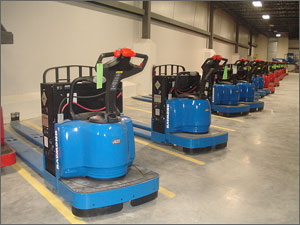 Forklifts are playing a part in real-world commercial trials of hydrogen fuel cells. |
Forklifts are a key component for real-world commercial trials of hydrogen fuel cells under a Department of Energy (DoE) project.
DoE's National Renewable Energy Laboratory (NREL) is serving as an independent, third-party assessor of the performance of the early fuel cell market demonstrations. Funding comes from the American Recovery and Reinvestment Act (ARRA) of 2009 and contributions from participating companies.
NREL's Hydrogen Secure Data Centre (HSDC) in Golden is analysing performance of approximately 1,000 hydrogen fuel cell units installed across the country in forklift, backup and stationary power sites and auxiliary power units.
Grants for the forklift trials account for about 23% of the fuel cell program's federal funding of USD42 million. Company commitments for the total fuel cell program amount to an additional USD51 million.
A forklift-intensive warehouse "looks like chaos" to an outsider, but the operation is effectively organised for productivity, says NREL's Jennifer Kurtz. "They have productivity measures, such as how much material is moved per eight-hour shift." A forklift that doesn't slow down as the hours pass or a forklift that can be refueled in four minutes - rather than have its battery replaced in 20 minutes - can have a positive impact on productivity, she notes.
"Even if it comes down to one minute of productivity gain, that's a noticeable improvement for warehouses where forklift use is really maxed out," says Kurtz, a senior engineer and team leader for the project.
Forklift fuel cell testing is under way in seven states, Kurtz says.
Third-party logistics supplier Genco Supply Chain Solutions of Pittsburgh, Pennsylvania has trials in two locations in Pennsylvania and single sites in South Carolina, North Carolina and Maryland.
Sysco Corp of Houston, Texas is using fuel cell powered forklifts capable of operating in hot or cold conditions at a warehouse in Houston. Sysco sells, markets and distributes food products to businesses and institutions.
Technology developer Nuvera Fuel Cells Inc of Billerica, Massachusetts is conducting a trial in Texas, and transportation, e-commerce and business service provider FedEx Corp of Memphis, Tennessee has a test under way at a site in Missouri.
Other than for forklifts, four firms are testing fuel cell backup power, one is testing combined power and heat, one is testing auxiliary power and two are testing portable power.
It is anticipated that the data analysis will help the companies understand how the fuel cell and hydrogen units perform along with comparisons with competing technologies.
The HSDC recognised a need to deliver useful information to the participating companies without betraying their internal secrets. "We protect the proprietary data by creating composite data projects," Kurtz says. "The data are aggregated across all the project partners."
A company can see its own data and how it compares with the aggregate data, but it cannot hone in on a competitor's specifics.
"Our first set of technical results for the ARRA projects will be later this year," Kurtz says. "NREL expects to be analysing and reporting on data through the award periods, which will end between 2011 and 2013."
The HSDC began analysing data from fuel cell vehicles in 2005.
The Alliance for Sustainable Energy LLC operates the NREL for the DoE office of energy efficiency and renewable energy.
Separately in the clean energy arena, three Washington, DC-based trade associations joined forces to encourage expansion of the US commitment for use of hydrogen and fuel cells.
"A clarification of priorities is needed," the organisations say in an 11 June statement. "To achieve our national goals for increased security and reduced pollutants, the US must expand its commitment to the clean energy options that hydrogen and fuel cells provide. We have learned from other advanced energy opportunities lost that it will be more expensive to buy these technologies back from foreign competitors if we let them finish what the US has started."
Collectively, the Electric Drive Transportation Association, the US Fuel Cell Council and the National Hydrogen Association represent more than 200 companies and organisations.